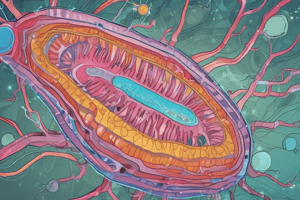Podcast
Questions and Answers
What is the primary function of signal peptides in protein targeting?
What is the primary function of signal peptides in protein targeting?
- To direct proteins to their appropriate locations (correct)
- To facilitate protein synthesis
- To degrade misfolded proteins
- To regulate gene expression
Which type of proteins do not require a signal peptide for targeting?
Which type of proteins do not require a signal peptide for targeting?
- Lysosomal proteins
- Mitochondrial proteins
- Secreted proteins
- Cytosolic proteins (correct)
What is the consequence of defects in protein targeting?
What is the consequence of defects in protein targeting?
- Human disease (correct)
- Cellular compartmentalization
- Protein synthesis inhibition
- Protein degradation
What do 'postcode' sequences resemble?
What do 'postcode' sequences resemble?
Where do proteins undergo synthesis when targeted to the ER?
Where do proteins undergo synthesis when targeted to the ER?
What is the primary function of the endoplasmic reticulum in protein targeting?
What is the primary function of the endoplasmic reticulum in protein targeting?
Which type of proteins are targeted to the lysosomes?
Which type of proteins are targeted to the lysosomes?
What determines the function of a protein?
What determines the function of a protein?
What is the primary function of chaperones in protein targeting?
What is the primary function of chaperones in protein targeting?
What is the role of the Nuclear Localisation Signal (NLS) in protein targeting?
What is the role of the Nuclear Localisation Signal (NLS) in protein targeting?
What is the name of the protein that binds to the NLS and facilitates protein transport to the nucleus?
What is the name of the protein that binds to the NLS and facilitates protein transport to the nucleus?
What is the role of the protein Ran in protein targeting to the nucleus?
What is the role of the protein Ran in protein targeting to the nucleus?
What is the specific sequence found at the C-terminus of peroxin proteins that facilitates targeting to the peroxisome?
What is the specific sequence found at the C-terminus of peroxin proteins that facilitates targeting to the peroxisome?
What is the primary function of the protein PEX5 in protein targeting?
What is the primary function of the protein PEX5 in protein targeting?
What is the general term for the sequence that facilitates protein targeting to the endoplasmic reticulum (ER) and Golgi apparatus?
What is the general term for the sequence that facilitates protein targeting to the endoplasmic reticulum (ER) and Golgi apparatus?
What is the general mechanism of protein targeting to the ER and Golgi apparatus?
What is the general mechanism of protein targeting to the ER and Golgi apparatus?
What is the purpose of the signal sequence in protein synthesis?
What is the purpose of the signal sequence in protein synthesis?
What is the function of the translocon in the ER membrane?
What is the function of the translocon in the ER membrane?
What is the role of signal peptidase in protein synthesis?
What is the role of signal peptidase in protein synthesis?
What is the purpose of the stop transfer sequence in protein synthesis?
What is the purpose of the stop transfer sequence in protein synthesis?
What is the function of the Golgi apparatus in protein synthesis?
What is the function of the Golgi apparatus in protein synthesis?
What is the role of v-SNARE proteins in protein targeting?
What is the role of v-SNARE proteins in protein targeting?
What is the function of the mannose-6-phosphate receptor in the Golgi?
What is the function of the mannose-6-phosphate receptor in the Golgi?
What is the function of the chaperone protein HSP70 in protein targeting?
What is the function of the chaperone protein HSP70 in protein targeting?
What is the purpose of the receptor in the outer mitochondrial membrane?
What is the purpose of the receptor in the outer mitochondrial membrane?
What is the fate of proteins translated in the cytosol?
What is the fate of proteins translated in the cytosol?
Flashcards are hidden until you start studying
Study Notes
Protein Targeting
- Cellular function is compartmentalized, and proteins have to be directed to different parts of the cell, including organelles, membrane proteins, secreted proteins, and cytosolic proteins.
- Protein sequences act as "postcodes" to direct proteins to the correct location.
Targeting Proteins to the Endoplasmic Reticulum (ER)
- Targeting proteins to the ER involves a signal peptide sequence that is recognized by the Signal Recognition Particle (SRP) complex.
- The SRP complex binds to the signal sequence and targets the ribosome to the ER membrane.
- The protein is then guided through the translocon (translocation channel) in the ER membrane into the ER lumen, and the signal sequence is cleaved.
Protein Synthesis at the ER
- Protein synthesis starts with a cytosolic ribosome, and the signal sequence is the first part of the protein synthesized.
- The signal sequence is recognized by SRP, and the complex binds to the SRP-receptor on the ER membrane.
Membrane Proteins and the RER
- Stop transfer sequences (20-22 amino acids) remain as transmembrane segments of proteins.
- Most proteins synthesized in the RER are glycosylated, and a common preformed 14-sugar oligosaccharide is added to asparagine residues.
ER is the Starting Point for Many Proteins
- ER is the starting point for many proteins, which then reach their final destination through a series of intracellular transport steps involving membrane vesicles.
- Proteins are often further processed in vesicles.
ER – Golgi Interactions
- Protein-containing vesicles bud off from the ER and migrate to the cis-Golgi, where further protein maturation occurs.
- In trans-Golgi, mature proteins are packaged into vesicles for specific compartments, and movement between cisternae of Golgi occurs via vesicles.
Targeting Vesicles to Specific Compartments
- Trans-Golgi vesicles are coated with specific v-SNARE proteins that allow them to be targeted to specific compartments.
- A complementary t-SNARE protein at the intended destination facilitates the correct targeting of the proteins.
Targeting Proteins to Lysosomes
- Lysosomal proteins are synthesized in the ER and transported to the trans-Golgi network.
- Lysosomal proteins are packaged into vesicles that are targeted to endosomes and phagosomes, which convert into lysosomes.
- Lysosomal proteins are tagged with mannose-6-phosphate in the Golgi, and the mannose-6-phosphate receptor directs proteins into correct transport vesicles.
Targeting Proteins to Mitochondria
- Targeting proteins to mitochondria occurs after translation is completed but before complete protein folding occurs.
- Proteins are complexed with chaperones (HSP70), and the specific signal sequence is recognized by a receptor in the outer membrane of mitochondria.
Targeting Proteins to the Nucleus
- Nuclear proteins contain a Nuclear Localization Signal (NLS), which is recognized by importin and transported through the nuclear pore.
- The process requires G-protein Ran and hydrolysis of GTP.
Targeting Proteins to Peroxisomes
- Peroxin proteins have a three-amino-acid sequence (Ser-Lys-Leu) at the C-terminus, which is recognized by PEX5 and imported into the peroxisome.
Summary
- Specific sequences in proteins allow for targeting to specific compartments.
- Specific proteins bind to each targeting peptide sequence.
- Secreted/membrane/lysosomal proteins have a signal sequence that facilitates entry into the ER/Golgi system, and transport involves vesicles.
- Nuclear/mitochondrial/peroxisome proteins have specific targeting sequences, and targeting occurs after translation is complete in the cytosol.
Studying That Suits You
Use AI to generate personalized quizzes and flashcards to suit your learning preferences.





